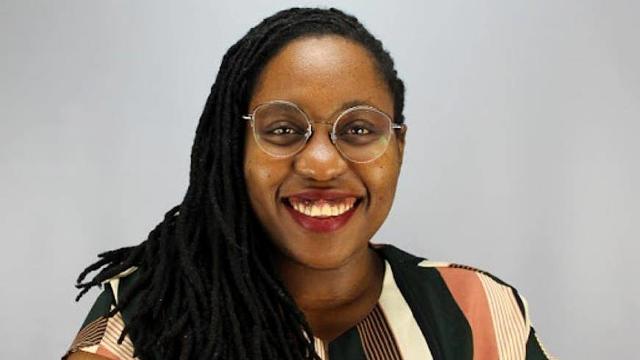Students who pursue a Master of Human Rights (MHR) degree at the University of Minnesota can expect an integrated approach to their training, which combines their academic knowledge with professional experience in the form of internships within the field.
The MHR degree program is jointly supported by the Humphrey School of Public Affairs and the College of Liberal Arts (CLA).
Joy Musyimi, a second-year MHR student, says her internships in the summer of 2022 complemented her academic work and her career interests.
We asked Musyimi, who also works as a research assistant for Humphrey School Dean Nisha Botchwey, to tell us more about the value of her internships.
Tell us about your background.
I am an international student from Kenya with an undergraduate degree and a post-graduate diploma in law. I practiced law in Kenya for two years in private practice and worked as a volunteer and documentary photographer for NGOs (non-governmental organizations) and IGOs (inter-governmental organizations) before moving to Minnesota. In my two years of practice, I decided to move to nonprofits and get involved in work that mattered to me. Documentary photography was my pathway to doing that and to being involved with human rights work.
Describe your internship experiences.
I had two internships over the summer. One was with the ACLU of Minnesota as a communications intern, focusing on immigrant rights and reproductive rights. My main roles were drafting and editing communications materials, providing research support and data analysis for reports, stories, and action alerts, creating content for print and digital media, and photography and video editing.
The other was with Alight (formerly the American Refugee Committee) as a protection sector intern, working with displaced people on gender-based violence protection and the protection of unaccompanied minors. My main roles were working with country protection technical leads to document success stories and promising practices, conducting desk reviews and pulling together key resources and tools to guide Alight’s global protection staff in their day-to-day work, and discussing matters regarding the department of global support.
Why did you want to work with these organizations?
I decided to work with Alight because the internship directly aligned with my career plans, and their work resonated with my values. Alight believes that the people they work with deserve human-worthy service, and I could see that in the work they were doing with refugee communities. Their work does not just end with providing basic needs or aid; they help the people they serve find connection, purpose, and joy in the challenging situations they are placed in. That is a core value of work I would like to be a part of.
With my background in documentary photography, I also wanted to keep building that aspect of my career. ACLU offered an internship in the communications department that not only allowed me to develop my communication skills but to do so in areas of focus that I was passionate about, and that would allow me to grow professionally. I was also given a chance to work on immigration issues, shadow the legal department, and do research on areas that were of interest to me.
How did these experiences complement your human rights coursework and your career plans?
My coursework concentration is in conflict, international security, and migration, and my internships approached this area from a wide range of perspectives. I was able to work with and expand my knowledge of the refugee community not only in the protection sector, but also in the legal sector, research, and communications. I was technically able to apply my coursework in these areas to real-life situations.
I intend to work with refugees and unprotected minors after completing the MHR program, and I had the opportunity to work directly in this field during my internship with Alight. That confirmed to me where I would like to be and the work I would like to be a part of. It was more or less like getting a green light career-wise.
What advice do you have for other MHR students as they approach their internships?
Trust the process. You are here, you are in a great program amongst great minds, and you are also a great mind and deserve to be here! Use the resources the Humphrey School has provided (those being the faculty, alumni, and guest speakers) to talk about your interests, get connections, and network with different organizations and people in your areas of interest. It might take one or two interviews to get your internship, and for some it might take 10 or more, so trust the process no matter how different your journey is from someone else's.
----
The Master of Human Rights degree program is jointly supported by the Humphrey School of Public Affairs and the College of Liberal Arts (CLA). A version of this interview was originally published by the CLA's Human Rights Program.


